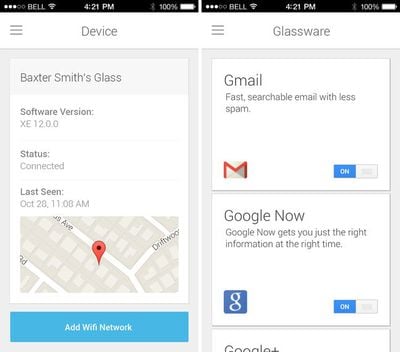Google today released a new MyGlass companion app for the iPhone, which is designed to increase compatibility between Google Glass and iOS devices. MyGlass is used to configure and manage Glass devices.

Use it to set up Glass, get directions on the go, screencast what you see on Glass to your phone, and add Glassware and contacts.
If you don’t have Glass, then downloading this will be a waste of time. Sorry about that. Learn more at google.com/glass.
Prior to the release of the MyGlass app, Google Glass had much more limited functionality with the iPhone, but Android users have long had access to an Android version of the MyGlass app which lets users Screencast from Glass to an Android smartphone and provides an interface for turning Glass apps off and on.
The same functionality will now be available for iPhone users, making Google Glass far more useful on Apple's platform.
Google Glass can be purchased via invitation from Google for $1500. MyGlass for iOS can be downloaded for free from the App Store. [Direct Link]
Update: MyGlass appears to have been pulled from the App Store, though it is unclear why.
Update 2: In a Google+ post, Google notes that MyGlass for iOS will launch later this week.
Great news iPhone fans, the iOS app is ready, but we need you to have this month’s Glass update first before it will work. We know we spilled the beans a bit too soon, but we’ll let you know when it’s available for download later this week.
Update 3: MyGlass is once again available in the App Store as of Thursday, December 19.























Top Rated Comments
It is pretty easy to justify an Apple purchase.
Show me a $1500 product from Apple with so little value.
I don't get it. He said "Show me a $1500 product from Apple with so little value." and you give him the prototype page form wikipedia?
Apple doesn't sell prototypes. They keep prototypes internal, determine internally if it's a product worth bringing to market, and then release it only if it is. Google, and other companies similarly known for halfassing things, on the other hand, is totally incapable of determining if a product is worth having or not and so they have to put prototypes out. Because supposedly customers know what they want. (They don't.)